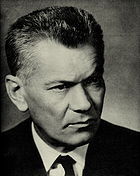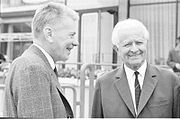
Josef Smrkovský
Encyclopedia


Czechoslovakia
Czechoslovakia or Czecho-Slovakia was a sovereign state in Central Europe which existed from October 1918, when it declared its independence from the Austro-Hungarian Empire, until 1992...
politician and a member of the Communist Party
Communist Party of Czechoslovakia
The Communist Party of Czechoslovakia, in Czech and in Slovak: Komunistická strana Československa was a Communist and Marxist-Leninist political party in Czechoslovakia that existed between 1921 and 1992....
reform wing during the 1968 Prague Spring
Prague Spring
The Prague Spring was a period of political liberalization in Czechoslovakia during the era of its domination by the Soviet Union after World War II...
.
Early life
Josef Smrkovský was born into a farmer's family in VelenkaVelenka
Velenka is a village in Nymburk District near the Labe River with the population of 247 innhabitants living in 123 houses and the area of 498 ha....
, Nymburk District
Nymburk District
Nymburk District is a district within Central Bohemian Region of the Czech Republic...
. As an adult, he began working as a baker and soon became a secretary of the Red Trade Union (1930–32) and was involved in the communist
Communism
Communism is a social, political and economic ideology that aims at the establishment of a classless, moneyless, revolutionary and stateless socialist society structured upon common ownership of the means of production...
movement. He joined the Communist Party of Czechoslovakia
Communist Party of Czechoslovakia
The Communist Party of Czechoslovakia, in Czech and in Slovak: Komunistická strana Československa was a Communist and Marxist-Leninist political party in Czechoslovakia that existed between 1921 and 1992....
(KSČ) in 1933 and went to study at a political school in the USSR. When he returned, Smrkovský began to work as a secretary of the KSČ in Brno
Brno
Brno by population and area is the second largest city in the Czech Republic, the largest Moravian city, and the historical capital city of the Margraviate of Moravia. Brno is the administrative centre of the South Moravian Region where it forms a separate district Brno-City District...
(1937–38).
World War II
During the Second World War, Smrkovský worked for the illegal communist resistanceCzech resistance to Nazi occupation
Czech resistance to German Nazi occupation during World War II is a scarcely documented subject, by and large a result of little formal resistance and an effective German policy that deterred acts of resistance or annihilated organizations of resistance...
to Nazi occupation
German occupation of Czechoslovakia
German occupation of Czechoslovakia began with the Nazi annexation of Czechoslovakia's northern and western border regions, known collectively as the Sudetenland, under terms outlined by the Munich Agreement. Nazi leader Adolf Hitler's pretext for this effort was the alleged privations suffered by...
and eventually became a member of the central committee. In May 1945, as a member of the Czech National Council
Czech National Council
The Czech National Council was the legislative body of the Czech Republic from 1968 to 1992. It was created in 1968 to reflect the fact that Czechoslovakia became a federation. It was legally transformed into the Chamber of deputies according to the Constitution The Czech National Council was the...
, he negotiated an agreement for the Nazi units in Prague
Prague
Prague is the capital and largest city of the Czech Republic. Situated in the north-west of the country on the Vltava river, the city is home to about 1.3 million people, while its metropolitan area is estimated to have a population of over 2.3 million...
to surrender. He is notorious (and often quoted) for preventing the US Army
United States Army
The United States Army is the main branch of the United States Armed Forces responsible for land-based military operations. It is the largest and oldest established branch of the U.S. military, and is one of seven U.S. uniformed services...
from liberating Prague via Plzeň – a claim he himself made publicly in the 1960s.
Victorious February and political imprisonment
Although the Czech National Council was dissolved and its members unpopular with Soviet authorities, Smrkovský was co-opted into the presidium of the Central Committee of the KSČ. He worked as a chairman of the Land Property Fund, and in 1946 was elected as a member of the National AssemblyNational Assembly
National Assembly is either a legislature, or the lower house of a bicameral legislature in some countries. The best known National Assembly, and the first legislature to be known by this title, was that established during the French Revolution in 1789, known as the Assemblée nationale...
. During the government crisis in February 1948, he served as a commander of the Lidové milice
People's Militias (Czechoslovakia)
People's Militias was a militia organisation of Communist Party of Czechoslovakia during between 1948 and 1989.- History :...
(People's Militias) and helped support the successful communist coup d'état
Czechoslovak coup d'état of 1948
The Czechoslovak coup d'état of 1948 – in Communist historiography known as "Victorious February" – was an event late that February in which the Communist Party of Czechoslovakia, with Soviet backing, assumed undisputed control over the government of Czechoslovakia, ushering in over four decades...
. He then found work in the Ministry of Agriculture.
In 1951, Smrkovský was suddenly arrested and condemned to life imprisonment for cooperation with a "conspiring centre" around Rudolf Slánský
Rudolf Slánský
Rudolf Slánský was a Czech Communist politician. Holding the post of the party's General Secretary after World War II, he was one of the leading creators and organizers of Communist rule in Czechoslovakia...
. He was released in 1955 and fully rehabilitated in 1963.
Prague Spring
After his release from prison, Smrkovský worked as a head of an agricultural cooperative (JZD Pavlovice). In 1963, he was assigned to work in various lower ministries, finally becoming Minister of Forestry and the Water System.Smrkovský contributed to the reform movement of 1968
Prague Spring
The Prague Spring was a period of political liberalization in Czechoslovakia during the era of its domination by the Soviet Union after World War II...
in a peculiar way. Not only did he support the removal of Antonín Novotný
Antonín Novotný
Antonín Novotný was General Secretary of the Communist Party of Czechoslovakia from 1953 to 1968, and also held the post of President of Czechoslovakia from 1957 to 1968. He was born in Letňany, now part of Prague....
from his post as Communist Party leader, but Smrkovský's public announcement ("What Lies Ahead") at the end of January 1968 demonstrated the real impact of Alexander Dubček
Alexander Dubcek
Alexander Dubček , also known as Dikita, was a Slovak politician and briefly leader of Czechoslovakia , famous for his attempt to reform the communist regime during the Prague Spring...
's election as First Secretary. Smrkovský was designated chairman of the National Assembly in April 1968, and as a talented speaker became (together with Dubček) one of the most popular politicians of the era. He was in favour of democratic reforms but maintained communist ideology, and continued to support the leading role
Vanguard party
A vanguard party is a political party at the forefront of a mass action, movement, or revolution. The idea of a vanguard party has its origins in the Communist Manifesto by Karl Marx and Friedrich Engels...
of the KSČ in the state.
Soviet occupation
"If someone thinks we are manoeuvred by the Soviets they are badly off base," said Smrkovský in the summer of 1968. His assessment proved incorrect. The Warsaw Pact invasion of CzechoslovakiaWarsaw Pact invasion of Czechoslovakia
On the night of 20–21 August 1968, the Soviet Union and her main satellite states in the Warsaw Pact – Bulgaria, the German Democratic Republic , Hungary and Poland – invaded the Czechoslovak Socialist Republic in order to halt Alexander Dubček's Prague Spring political liberalization...
took only one day. Smrkovský and the other leading exponents of reform were deported to Moscow
Moscow
Moscow is the capital, the most populous city, and the most populous federal subject of Russia. The city is a major political, economic, cultural, scientific, religious, financial, educational, and transportation centre of Russia and the continent...
where they were instructed to sign the so-called Moscow Protocol
Moscow Protocol
Moscow Protocol was a document signed by Czechoslovak political leaders in Moscow, after the Prague Spring. The negotiations took place from 23 to 26 August 1968...
(only František Kriegel
František Kriegel
František Kriegel was a Czechoslovak politician, physician, and a member of the Communist Party reform wing of Prague Spring...
refused). Upon his return, Smrkovský tried unsuccessfully to keep the Stalinist wing from taking control. He was demoted at the request of Gustáv Husák
Gustáv Husák
Gustáv Husák was a Slovak politician, president of Czechoslovakia and a long-term Communist leader of Czechoslovakia and of the Communist Party of Czechoslovakia...
, suspended from KSČ, and widely denounced. In 1971 he took part in the birthday celebration of Bohumil Hrabal
Bohumil Hrabal
Bohumil Hrabal was a Czech writer, regarded as one of the best writers of the 20th century.- Life and work :...
. He died in 1974, and was buried under police control. The obituary letter sent by Dubček to Smrkovský's relatives was published in Italian daily Giorni - Vie Nuove and reprinted in Le Monde
Le Monde
Le Monde is a French daily evening newspaper owned by La Vie-Le Monde Group and edited in Paris. It is one of two French newspapers of record, and has generally been well respected since its first edition under founder Hubert Beuve-Méry on 19 December 1944...
or New York Herald Tribune
New York Herald Tribune
The New York Herald Tribune was a daily newspaper created in 1924 when the New York Tribune acquired the New York Herald.Other predecessors, which had earlier merged into the New York Tribune, included the original The New Yorker newsweekly , and the Whig Party's Log Cabin.The paper was home to...
.

